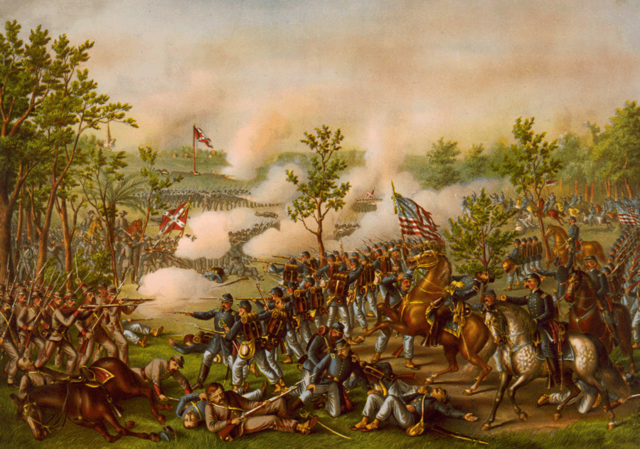There are a lot of stories I want to write about, especially the infuriating Texas law that will close down nearly every family planning clinic in the state. But for today, there’s an important one that’s been flying under the radar and deserves more attention: the fight over high school history classes in Jefferson County, Colorado. It’s a local story, but it has a much broader national resonance.
The background of this is that, in 2012, the College Board rolled out a new curriculum for Advanced Placement U.S. history classes. In response, the Republican National Committee – which is always seeking new things to oppose, apparently – passed a resolution that called the new framework a “radically revisionist view of American history that emphasizes negative aspects of our nation’s history” and called for it to be replaced with a more ideologically acceptable alternative. (The RNC’s main concern seems to be a greater emphasis on slavery and Native American issues.)
Last year’s elections in Colorado’s Jefferson County brought in a new school board with a 3-2 conservative majority. And in September, they moved to put the RNC’s desires into action by passing a vote calling for the alteration of the AP history curriculum, which contained this actual language:
Williams’ proposal calls for instructional material presenting “positive aspects” of U.S. heritage that “promote citizenship, patriotism, essentials and benefits of the free enterprise system, respect for authority and respect for individual rights.”
Materials should not, it says, “encourage or condone civil disorder, social strife or disregard of the law.”
The heavy use of conservative code words, especially “patriotism” and “respect for authority”, make it clear that what they seek is a whitewash: history simplified to a conservative morality play, where good Americans go to church, believe in unregulated capitalism, and are content to keep to their place. Everything that’s complicated, ugly or unpleasant in our history would be downplayed if not eliminated entirely.
And if you think I’m being uncharitable, they’ve said as much themselves. Julie Williams, one of the Jefferson County conservatives, defended her proposal by saying, “I don’t think we should encourage our kids to be little rebels.” Pam Mazanec, a conservative member of Colorado’s board of education, provided another pitch-perfect illustration of this last week when she said in a debate over the curriculum that America ended slavery “voluntarily” and that this was proof of our national exceptionalism.

The absurdity and irony of this is that America as a country was founded on civil disobedience and rejection of existing law. From the Revolution onward, from suffragists’ hunger strikes to lunch counter sit-ins, every change for the better has been accompanied by intense strife and division. It’s telling that the proposed conservative alteration contrasts “patriotism” to “civil disorder [and] social strife”, as if the two were mutually exclusive. (Real patriots sit down, shut up and do as they’re told.)
But it quickly became clear that the people of Jefferson County already understand this in a way that their school board never did. Both students and teachers responded magnificently, staging walkouts, sickouts and mass protests that forced schools to close. (Yes, students striking and protesting to improve the quality of their own education.) There was also a Twitter hashtag, #JeffCoSchoolBoardHistory, satirizing the board’s jingoistic pretensions.
And this weekend, there was good news: in response to the uproar, the school board voted to scrap its whitewashed history program. Still, students, teachers and parents are little mollified – nor should they be, since the vote also created a curriculum-review committee whose members are chosen by the board, leaving open the possibility of more mischief in the future.
It’s very encouraging that the conservatives were forced to back down for now. If they had gotten away with this, there’s no way they would have stopped with history classes. For a certainty, many other subjects would have been next – English literature, science, health – all of them revised, pared down and scrubbed of anything that might have offended simplistic sensibilities.
As I said, this story is local, but it has national resonance. The public schools are where we decide what we value as a society, what we believe about ourselves, and what stories we tell to define who and what we are. Inevitably, this means they’re also the place where America’s culture-war issues come to a sharp point.
The idea that America’s record needs to be sheltered from excessive criticism is an insult to students’ ability to think critically and judge for themselves. Any honest history class would acknowledge that there’s plenty of weight on both sides of the scale and let them make up their own minds.
We can say truthfully that we’re a nation built on reason and democracy, that welcomes immigrants from every land, that explicitly sets down the freedoms guaranteed to its citizens, that fought and defeated totalitarianism in the darkest hours the world has seen so far. We can say, with equal justice, that we’re a nation built on genocide of indigenous peoples and the brutalizing practice of human slavery. We still struggle with a historical legacy of racism, in the form of segregation, Jim Crow, internment and more. We’ve been grievously prone to wars of belligerence and imperialism, to waves of domestic paranoia and suspicion, and a justice system tilted toward the haves and against the have-nots.
Our history has been a long battle between these opposing currents. Any history class worth taking will seek to capture that, to convey a sense of that continuing struggle. There will always be people, by nature often people holding power, who don’t want this textured picture to be presented, who want to urge students toward a predetermined conclusion. But the very principles that make America what it is all but guarantee that, in the long run, they’ll always fail.